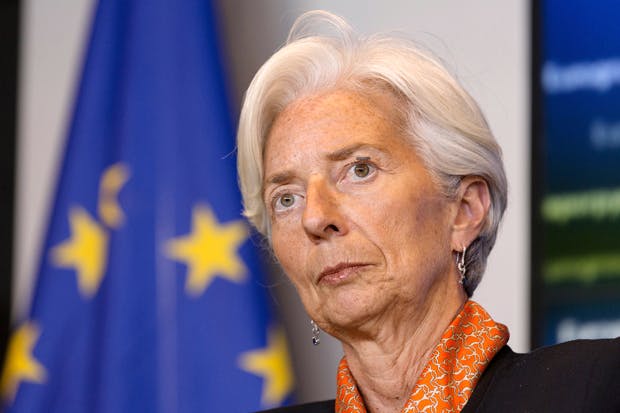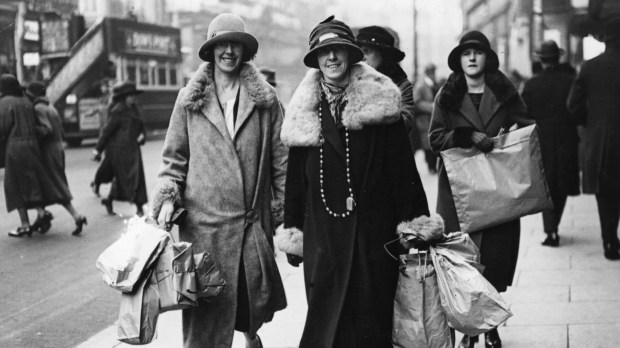The Greek drama took a turn few of us expected last week, when the world thought compromise was imminent. What happens after Sunday’s referendum is anyone’s guess — but recrimination is already flying, much of it aimed at IMF managing director Christine Lagarde. Having inherited the Greek headache from her predecessor Dominique Strauss-Kahn after his resignation in 2011, she has always talked tough — but now stands accused of setting aside IMF rules, as well as long-established blueprints for debt relief and the views of many of the Fund’s own economists, in order to stay aligned with the European Commission and the European Central Bank in the ‘troika’ of bailout negotiators.
Underlying these criticisms is the implication that, as a former French finance minister, Lagarde has allowed Europe’s political imperative — preservation of the euro at all costs — to overwhelm IMF principles. More usually thought to be dominated by US influence like its Washington neighbour, the World Bank, the IMF is being painted as Europe’s stooge. If the failure of the troika to negotiate a durable settlement at an earlier stage leads to the wipeout of Greece’s €24 billion debt to the IMF, nations -poorer than Greece will find funding harder to access in future. It’s also increasingly unlikely that Lagarde will be reappointed when her term ends next year — or perhaps even that the job will go to another European, as it has done since the fund was created in 1946.
Much of my sympathy is with Lagarde, who has always struck me as a woman of formidable integrity and intellect. Of course the troika needed to present a united front when Europe’s wider financial stability was at stake — and as with any bad debt, national or personal, responsibility rests far more with the borrower than the lenders. This cataclysm has been caused by profligate and dishonest Greek politicians, abetted by Brussels — but there’s bound to be collateral damage, and I’m sorry to say that Christine Lagarde’s career is beginning to look like toast.
Head of whose values?
Would it be unkind to suggest that the CBI has chosen as its new director-general the female equivalent of Ian Fletcher from W1A — the BBC’s fictional Head of Values, played by Hugh Bonneville?
Yes, it probably would. But the CV of the successful candidate, Carolyn Fairbairn, is certainly in tune with the zeitgeist. Like three of her six CBI predecessors, she comes from the stable of McKinsey, the Teflon-coated management consultancy that has enjoyed ‘Pretty much uninterrupted access to 10 Downing Street for decades,’ according to its biographer: indeed, she went straight from McKinsey to the Downing Street policy unit before moving to the BBC to pilot its ‘building public value’ strategy. My work-experience mole who brought cappuccinos in for the CBI selection panel says she impressed as ‘extremely intelligent and eminently sensible, as well as being charming’. That’s good: the voice of business needs va-va-voom after the sotto voce of retiring director-general John Cridland.
But here’s a caveat. Carolyn Fairbairn has clearly been picked to spearhead the CBI establishment’s pro-EU stance in the referendum debate — and to charm audiences when she sits next to Nigel Farage on Question Time. Fifteen years ago, that establishment was in favour of joining the euro. CBI leaders have always blown with the political wind, rather than representing diversity or radicalism among business views — and that tendency is fuelled by the fact that the body representing British industry has not chosen an authentic industrialist as its spokesman since Sir Terence Beckett of Ford got the job in 1980 and urged members into a ‘bare-knuckle fight’ with Margaret Thatcher. Instead (with the possible exception of Digby Jones, though he’s more tub–thumping today than he was in his CBI days) it has gone for smooth communicators who know the line to take. Still, at least they haven’t appointed Siobhan Sharpe, W1A’s Perfect Curve brand consultant.
Call Sir Herbert
What’s the matter with Network Rail? Almost everything. The ‘not for dividend’, not-quite-nationalised track operator born from the wreckage of privatised Railtrack has turned out to be not-for-delivery as well. Incapable of carrying out the £38 billion five-year plan set for it only last year, the company has been forced to ‘pause’ long-overdue electrifications of the Midland mainline and the Leeds-Manchester route that’s supposed to be the artery of the ‘Northern Powerhouse’. When reprivatisation might have been the best way to inject rigour and urgency, Network Rail has been sucked deeper into the public sector — with its borrowings on the Treasury balance sheet, rather than fudged as before, and Transport Secretary Patrick McLoughlin wading in to replace chairman Richard Parry-Jones, who came from the car industry, with lifelong public-transport man Sir Peter Hendy.
At least the latter move is positive, because railways need experienced railway-men and Network Rail has recently lost several, including former chief executive Sir David Higgins, in a ‘brain drain’ to the higher-paying High Speed 2 project. I can only wonder how long Higgins’s successor Mark Carne, who came from the oil industry, will survive in the job.
In that context I’m delighted to receive a postcard from I.K. Gricer, Christopher Fildes’s long-retired railway correspondent, who reminds me that he served his apprenticeship under Sir Herbert Walker, general manager of Southern Railway from 1923 to 1937 and father of ‘third-rail electrification’ across much of its network. What was Walker’s modus? According to historian Michael Bonavia: ‘First, he was an excellent judge of financial propositions. Next, he eliminated any frills that were not essential to the electrification project itself, and exercised a strict control over estimating, progress checking and finally the monitoring of results.’ Carne, if he hopes to enter the railway hall of fame, should call Walker on the Ouija board.














